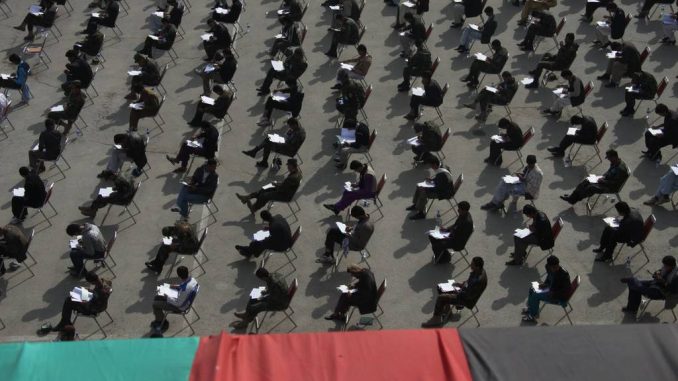
Monday marks 100 days of hell for my Afghan National Army colleagues. I trained them in Afghanistan as an academic advisor in 2010 and 2011, though some were in my classroom in the Defense Language Institute at Lackland Air Force Base in Texas before and after that period. Some were civilian contract interpreters or faculty at the National Military Academy of Afghanistan, some military professors, and others were pilots, commandos, and military academy students.
I am working the cases of more than 700 Afghans in hiding. The unpaid required 60-100 hours of work is a liquid that fills every crevice of my time. If I do not do this work, there is truly no one else who will because there is no alternative available and these innocent lives are at stake. I am only working on the cases of people connected to the U.S. Air Force who are in my slice of the universe, but I am inundated daily with calls for help from dozens of other families desperate for rescue. I cannot help them, but they deserve evacuation to safety just as much as every person on my list.
RELATED
:quality(70)/cloudfront-us-east-1.images.arcpublishing.com/mco/EUEO3MP2HVDU7C253Q453SEFK4.jpg)
Afghan evacuations are not something I was trained to do, prepared for, or expecting to be involved with — the crisis was thrust upon me as the American military advisor of Special Immigrant Visa applicants. I am no longer a U.S. government employee, but a full-time student on scholarship (my foci are international law and diplomacy in Islamic societies) working 4 work-study jobs for my university. I should not be the government’s plan, and yet somehow I am.
The crisis created by the abrupt American withdrawal sans a robust, detailed evacuation plan for all SIV applicants and their dependents doesn’t consider the impact on American veterans at all. The costs are serious: we are frayed, we are out of money, and we are running low on hope. I am a graduate student. I should be focused on commitments that I made (school and my jobs), not trying to gap-fill for the government of the most powerful and capable country on Earth. The veterans coalition is an ad hoc crew of nonprofit organizations staffed by volunteers at the edges of human limits. We are suffering because we are doing the heavy lifting — compiling required documents, entering them on endless spreadsheets — none of which are formatted the same, fielding Afghans’ questions, panic, and legitimate emergencies. We are resilient in our problem-solving — this is a hybrid of the American way (assuming responsibility) of doing things and the Afghan way of doing things (finding workarounds when the system fails).
While this hybrid is a testament to all the beautiful parts of human behavior (compassion, creativity), it is a damning condemnation of a system gone wrong — mediocre men made messes because they were unconcerned with adherence to international legal norms and more troublingly the human rights concerns behind them. There is no acceptable loss of human life, and especially not because we simply were unmotivated to ensure the safety of people we directly endangered. Ethically, we are on the hook and we know better than to engineer hellscapes and recklessly risk lives — whether those lives are Afghan allies or those of American veterans.
RELATED
:quality(70)/cloudfront-us-east-1.images.arcpublishing.com/mco/BNHPJ4NYNZELDFWLXIPSDY7WRA.jpg)
The prevailing approach of the U.S. government, both the Trump administration and the Biden administration, has not been brave, responsible, or honorable. It has just chewed up innocent people and spat them out, mangling American lives and Afghan lives in the process. It’s as if we voluntarily opted to create fodder for terrorists like the Taliban in both Afghanistan and Pakistan, the Haqqani Network, Al-Qaeda, and Lashkar-e-Tayba. Even ISIS benefits from this narrative we’ve created — one of interference, one of damage, one of exploitation for the purposes of private corporation enrichment or male military officer’s promotion potential. We have much to answer for — but it should not be a debt of blood of American veterans and its certainly not appropriate or acceptable to abandon our Afghan allies. We promised to get them out and we risk a low-intensity genocide if we fail to keep that promise.
The Universal Declaration of Human Rights (1948) enshrines the rights of all persons, by virtue of being born, to security, migration, asylum from perspective, and freedom of movement. These standards were established by the world in the wake of the Holocaust of World War II. The purpose was to protect human life to ensure that genocide would not threaten the survival of populations and that another world war could be averted. There are plenty of laws that support the Universal Declaration of Human Rights, but the U.S. has made no effort to comply with these standards nor acknowledge the motives and commitments embedded within them.
The evacuation burden should not be on American veterans’ shoulders, and America must muster the political will to clean up the mess we made — it will not get better by ignoring it and we cannot afford more blood on our hands.
Lark S. Escobar is both an international educator and student scholar, interested in genocide prevention, cultural memory, religious heritage, human rights, international law, terrorism studies, and human security in MENA, Central Asia, and South Asia. She has taught in seven countries in higher education contexts, including creating and implementing an American English & Culture degree at the National Military Academy of Afghanistan where she was an academic, gender, and culture advisor, heading the English department for NATO headquarters and designing and conducting university faculty professional developing and secondary educator training throughout the Middle East.
Editor’s note: This is an Op-Ed and as such, the opinions expressed are those of the author. If you would like to respond, or have an editorial of your own you would like to submit, please contact Military Times senior managing editor Howard Altman, haltman@militarytimes.com.


Be the first to comment